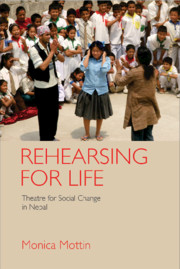Book contents
- Frontmatter
- Dedication
- Contents
- List of Tables, Figures and Boxes
- Acknowledgements
- Chapter 1 Theatre and Life: Theatre at the intersection of art, politics and international development
- Chapter 2 Spacing Out to Speak Up: Resistance, protest and the emergence of street theatre
- Chapter 3 The Streets Become the Stage: Performance, protest and theatre in a time of political crisis
- Chapter 4 Kachahari Natak: Fragments of an aesthetics of theatre for social change
- Chapter 5 Activism not Development Work: Explorations in Tharu kachahari natak
- Chapter 6 A Cultural Army for a Cultural Revolution: Maoist cultural programmes and revolutionary theatre
- Chapter 7 The Ordinariness of the Special: Towards the professionalization of theatre work
- Chapter 8 Conclusions
- Bibliography
- Index
Chapter 6 - A Cultural Army for a Cultural Revolution: Maoist cultural programmes and revolutionary theatre
Published online by Cambridge University Press: 05 April 2018
- Frontmatter
- Dedication
- Contents
- List of Tables, Figures and Boxes
- Acknowledgements
- Chapter 1 Theatre and Life: Theatre at the intersection of art, politics and international development
- Chapter 2 Spacing Out to Speak Up: Resistance, protest and the emergence of street theatre
- Chapter 3 The Streets Become the Stage: Performance, protest and theatre in a time of political crisis
- Chapter 4 Kachahari Natak: Fragments of an aesthetics of theatre for social change
- Chapter 5 Activism not Development Work: Explorations in Tharu kachahari natak
- Chapter 6 A Cultural Army for a Cultural Revolution: Maoist cultural programmes and revolutionary theatre
- Chapter 7 The Ordinariness of the Special: Towards the professionalization of theatre work
- Chapter 8 Conclusions
- Bibliography
- Index
Summary
I want to put forward a short commitment (pratibaddhata). This is not only mine. This is the commitment of our whole Samana Battalion cultural movement. I take the commitment to fulfill the dream of the martyrs. […] We, cultural workers, want to give you our commitment. In this coming storm, we will also, at any cost, play our role. This commitment we put in front of you. What we are singing in front of you people, these all are your own songs, including your pains, your tears, your happiness. Through these songs we can stop the hidden royalist system from raising their head and to stop them we will go to Singha Durbar and to the Royal Palace with harmoniums and guitars. Then, if it does not work, we will join the PLA [People's Liberation Army] to enter Narayanhiti [Royal Palace]. This is our oath. You may wonder, ‘how can you reach Narayanhiti?’ You can see it in our banner, Samana Cultural Battalion, Battalion means warriors, cultural war, cultural army, cultural fighters. We are not only cultural workers. We don't want to be only artists. Political people and intellectuals say that artists should be independent, they should not have any political affiliation, they should not be attached to politics. But we say we are artists and we want to join politics. We want to sing the songs of the people. Politics is a way to free suffocated people. We, artists, want to do the same. This is our commitment as artists.
The Maoist revolutionary cultural programmes represented another type of performance for social change available to Nepali audiences in those transitional years. Catchy melodies, colourful dresses, traditional steps broken by classical mudras suddenly turning into clenched fists: since the beginning of the People's War in 1996, Maoist cultural troupes travelled the country offering villagers engaging politicocultural programmes; after the People's Movement in 2006, they also performed in the cities and in the capital. The first ‘Cultural Battalion’, Madhya Samana Battalion 6 was formed in October 2006. It included the four ‘cultural companies’ of Central Nepal, Sen Chyang Cultural Company, Anekot Cultural Company, Shiva Sharada Cultural Company, and Chunu Shilpa Cultural Company.
- Type
- Chapter
- Information
- Rehearsing for LifeTheatre for Social Change in Nepal, pp. 182 - 208Publisher: Cambridge University PressPrint publication year: 2017



